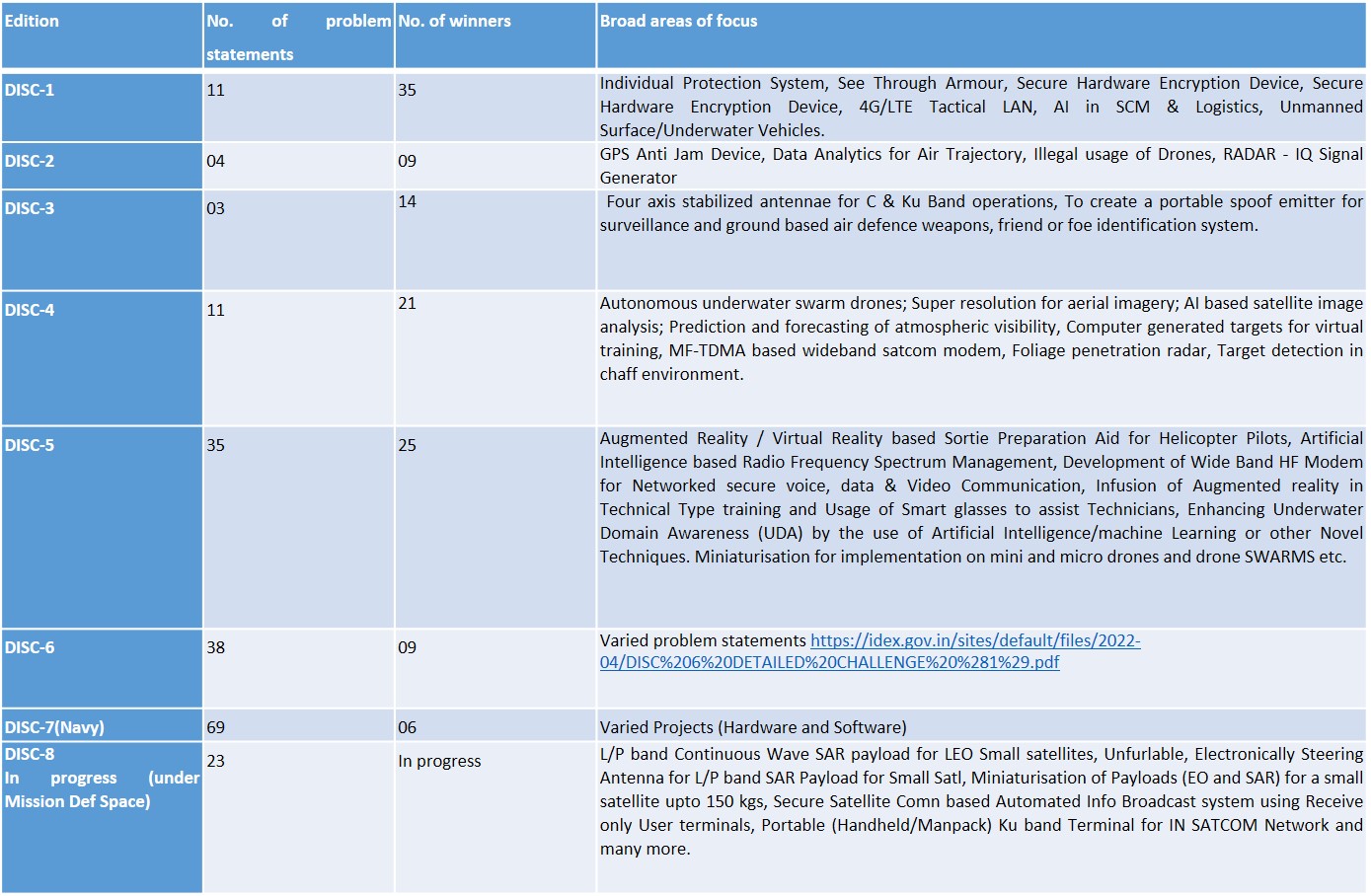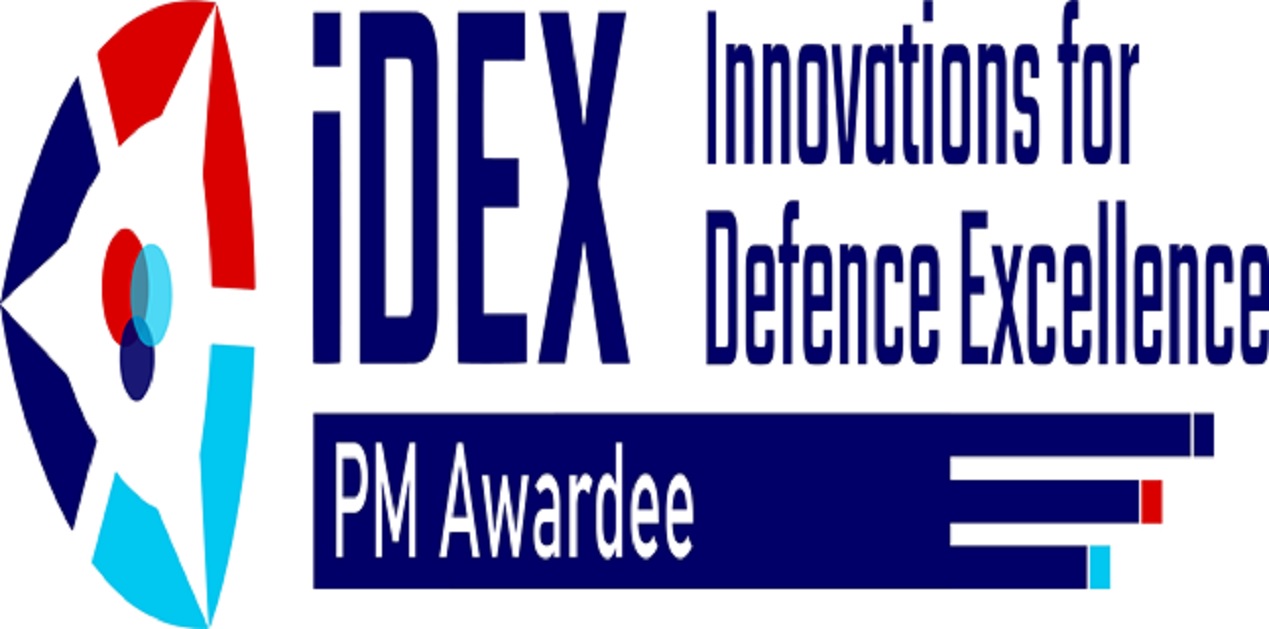Innovation for Defence Excellence (iDEX) and the Defence India Start-up Challenge (DISC) platforms
The iDEX platform was launched in April 2018 under the DIO (Defence Innovation Organisation) and the aim was for “creation of an ecosystem to foster innovation and technology development in Defence and Aerospace by engaging industries including MSMEs, Start-ups, Individual Innovators, R&D Institutes and Academia and providing them grants/funding and other support to carry out R&D which has potential for future adoption for Indian Defence and Aerospace needs.” The programme under the iDEX which undertakes these measures is known as the DISC (Defence India Startup Challenge). The Department of Defence Production, Ministry of Defence announced a budgetary support of Rs. 498.80 crore for the years from 2021-22 to 2025-26. The objective of the scheme is to provide financial support to nearly 300 Startups/ MSMEs/ individual innovators and about 20 Partner incubators through Defence Innovation Organisation (DIO). Funds allocated till Oct 2022 were that Rs 300 crore had been approved for over 100 iDEX winners to develop products/technologies in more than 50 technological areas. Since the launch of iDEX, about 6,000 applications over seven editions were received. The eighth edition has also been launched recently. Money allocated under the iDEX’s DISC is a maximum of Rs 1.5 crores per project. Higher funding of upto Rs 10 crores for projects is given under the iDEX Prime programme.
Under the iDEX platform there are various programmes which cater for all the three services as well as Ordnance Factories Board/Defence Public Sector Undertakings (OFB/DPSUs). The SPRINT ({Supporting Pole-Vaulting in R&D through Innovations for Defence Excellence (iDEX), NIIO and Technology Development Acceleration Cell (TDAC)} programme which started concurrently with the 7th edition of DISC caters for the Navy. In addition one Prime SPRINT challenge was also launched with 06 problem statements.
Over the 08 editions of the iDEX, the broad areas or problem statements which have sought to be addressed are:-[1]

In addition to the 08 DISC challenges there have been 05 Open challenges, in which Innovators, Startups and MSMEs can now engage directly with the military through the iDEX Open challenge to showcase their technologies. Some of which are on Adaptive stealth, Long Endurance Aerial Surveillance Platform, Smart Loitering Munitions, Precise attack loitering munitions, ALFA-S (Air Launched Flexible Asset - Swarm Drones), HAPS (High Altitude Pseudo Satellite) and Quantum Security Keys Over 200Kms.
There has been one prime challenges in Defence space area in which 12 problem statements have been given and is open till January 2023. The areas of focus in the prime space are at developing technologies addressing every stage of a space mission – from mission planning to satellite data analytics. The iDEX programme has progressed and signed till 14 Feb 2023 under the various editions 200 contracts in which a total of 3335 startups or MSME or individual Innovators have been engaged.[2] The Defence Acquisition Council (DAC), chaired by Raksha Mantri, on March 22, 2022, cleared the procurement of 14 items worth Rs 380.43 crore from the Innovations for Defence Excellence (iDEX) startups/MSMEs and it is expected that around 25-40 items after the successful prototyping by the iDEX startups/MSMEs, will be ready for procurement by the year end [3]. These items will be procured by the Indian Army, Navy and Air Force. The aim of engaging with and creating an eco-system by harnessing the talent in the country is well on its way.
Raksha Mantri also launched the Ninth edition of Defence India Startup Challenges (DISC 9) on “Cybersecurity” with 28 problem statements, and the iDEX Investor Hub (iIH). More than Rs 200 crores have already been pledged under iIH by leading Indian investors. DISC 9 is the first collaboration of iDEX with Indian Cyber Crime Coordination Centre (i4C) division of Ministry of Home Affairs.
Making it Better
While a lot of work is being put in some suggestions for improvement there are certain challenges in developing the concept into a viable product post acceptance. The Services and DPSUs may be encouraged to accept a certain percentage of funded concepts for induction which would provide for increased speed in production. The funding requirements of the individual, startups and micro industries may be reduced to increase the number of players in the initial stages. The corpus presently allotted for the iDEX needs to be increased from the present 500 Crores. Another area of focus could be the IPR protection, expanding the agencies where testing can occur and certification timelines can be expedited. Funding under the budget may be increased for the projects, as well for greater number could be done. Also working capital requirements for the startup needs to be facilitated on easier terms.
Conclusion
The areas in which concepts and products are being sought to be developed are both in the hardware and software areas. These technologies and innovations lead to capacity building in manpower and niche technologies which can and will be harnessed for both domestic and international markets as the awareness and demand materializes. The iDEX is a great initiative to harness and develop the indigenous market. The policy is alive to the ground level and constant changes are being made.
Endnotes :
[1]https://ddpdashboard.gov.in/StartupsInDefence/startups_challanges
[2]https://www.pib.gov.in/PressReleasePage.aspx?PRID=1899379
[3]https://pib.gov.in/PressReleaseIframePage.aspx?PRID=1808408
https://ddpdashboard.gov.in/
(The paper is the author’s individual scholastic articulation. The author certifies that the article/paper is original in content, unpublished and it has not been submitted for publication/web upload elsewhere, and that the facts and figures quoted are duly referenced, as needed, and are believed to be correct). (The paper does not necessarily represent the organisational stance... More >>
Image Source: https://idex.gov.in/











Post new comment